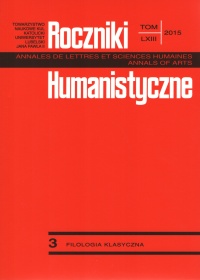Dzieje Herodota Z Halikarnasu – zagadnienia teoretyczne
Abstract
Besides its historical values which imply a certain “accuracy” in presenting historical events and people, it is also possible to stipulate in Herodotus’ Histories these fragments which belong only to the domain of fiction, a genre literature whose basic substratum consists primarily in the description of the world seen through the eyes of the narrator-witness (histōr). In case of Histories, it is difficult to explicitly define how much of it is history and how much is literature. Nevertheless, it is certain that Histories are a special kind of storytelling, which, as shown by a closer analysis, is based on a personal and vicarious experience of the historian and his oral sources that cover several dozens of years of conflict between the East and the West, intertwined with historical, geographical and ethnological descriptions of Greek and barbaric tribes. In such a context the paper will focus on presenting a twofold nature of Herodotean discourse, revealing, on the one hand, the “rising” of the oral history from the sheer activity of dialoguing with people about the recent past, reconstructed on the basis of its formal and cognitive structure (Fludernik 1996), and, on the other hand, the technique of emplotment (White 1973) used by Herodotus to make the story reportable and tellable within the realm of an epic convention which was vivid and influenced the Archaic and Classical Greek literary texts of his times.
References
Ankersmit F.: Narracja, reprezentacja, doświadczenie. Studia z teorii historiografii, ed. and introduction by E. Domańska, Kraków: Universitas 2004.
Bakker E.J.: The Making of History: Herodotus’ Historiēs Apodexis, in: E.J. Bakker, I.J.F. de Jong, H. van Wees (ed.), Brill’s Companion to Herodotus, Leiden–New York–Köln: Brill 2002, p. 3-32.
Blau H.: Written Composition and Oral Discourse, “The English Journal” 57(1968), no 3, p. 369-371.
Branscome D.: Textual Rivals. Self-Presentation in Herodotus’ Histories, Michigan: The University of Michigan Press 2013.
Connor W.R.: The Histor in History, w: R.M. Rosen, J. Farrell (ed.), Nomodeiktes: Greek Studies in Honour of Martin Ostwald, Ann Arbor: The University of Michigan Press 1993, p. 3-15.
Demont P.: Figures of Inquiry in Herodotus’s “Inquiries”, “Mnemosyne” 62(2009), no 2, p. 179-205.
Evans J.A.S.: Herodotus the Explorer, Princeton: Princeton University Press 1991.
Gray V.: Herodotus’ Literary and Historical method: Arion’s Story (1.23-24), “The American Journal of Philology” 122(2001), no 122, p. 11-28.
Fehling D.: Die Quellenangaben bei Herodot: Studien zur Erzählkunst Herodots, Berlin: De Gruyter 1971.
Fehling D.: Herodotus and His Sources: Citation, Invention, and Narrative Art, transl. by J.G. Howie, Leeds: F. Cairns 1989.
Fludernik M.: Towards a Natural Narratology, London: Routledge 1996.
Fowler R.: Herodotus and His Contemporaries, “Journal of Hellenic Studies” 116(1996), p. 62-87.
Grethlein J.: Experience and Teleology in Ancient Historiography: ‘Futures Past’ from Herodotus to Augustine, Cambridge: Cambridge University Press 2013.
Grethlein J.: From “Imperishable Glory” to History: The Iliad and the Trojan War, in: D. Konstan, K.A. Raaflaub (ed.), Epic and History, Oxford: Oxford University Press 2014, p. 122-144.
Hartog F., Hayes W.R.: Herodotus and Historiographical Operation, “Diacritics” 22(1992), no 2, p. 83-93.
Immerwahr H.: Form and Thought in Herodotus, Cleveland: The Press of Western Reserve University 1966.
Kazazis J.K.: Herodotus’ Stories and History: A Proppian Analysis of His Narrative Technique, PH.D. diss., University of Illinois at Urbana-Champaign 1978.
Kindt J.: Delphic Oracle Stories and the Beginning of Historiography: Herodotus’ Croesus Logos, “Classical Philology” 101(2006), no 1, p. 34-51.
Labov W., Waletzky J.: Narrative Analysis: Oral Versions of Personal Experience, in: J. Helm (ed.), Essays on Verbal and Visual Arts, Seattle: Distributed by the University of Washington Press 1967, p. 12-44.
Lang M.: Oral History with a Difference, “Proceedings of the American Philosophical Association” 128(1984), no 2, p. 93-103.
Lang M.: Herodotean Narrative and Discourse, Cambridge: Harvard University Press 1984.
Luraghi N.: The Importance of Being logios, “Classical World” 102(2009), p. 439-456.
Nagy G.: Herodotus the Logios, “Arethusa” 20(1987), no 1-2, p. 175-184.
Nagy G.: The Ancient Greek Hero in 24 Hours, Cambridge MA: Harvard University Press 2013.
Stadter P.: Herodotus and the North Carolina Oral Narrative Tradition, “Histos” 1(1997), p. 13-41.
Thomas R.: Herodotus in Context: Ethnography, Science, and the Art of Persuasion, Cambridge: Cambridge University Press 2000.
Turasiewicz R.: Zakres znaczeniowy terminu λογογράφ́ος w greczyźnie wieku w. V i IV p.n.e., “Eos” 84(1996), p. 23-34.
Verdin H.: De historish-kritische Method van Herodotus, Brussels: KAWLsK 1971.
White H.: Figuring the Nature of the Times Deceased: Literary Theory and Historical Writing, in: R. Cohen (ed.), The Future of Literary Theory, New York–London: Routledge 1989, p. 19-43.
White H.: Poetyka pisarstwa historycznego, transl. from English E. Domańska, M. Loba, A. Marciniak, M. Wilczyński, Kraków: Universitas 2010 (wydanie II poprawione).
Wieżel I.: Herodotus’ Histories as Natural Narrative. Croesus’ Logos I. 6-92, “Amsterdam International Electronic Journal for Cultural Narratology” 6(2010/2011); http://cf. hum.uva.nl/nar ratology/index.html.
Wieżel I.: Oralna perspektywa opowiadania “Dziejów” Herodota z Halikarnasu. W kierunku poetyki ustności prozy, Kraków–Lublin: Scriptum 2012.
Copyright (c) 2015 Roczniki Humanistyczne

This work is licensed under a Creative Commons Attribution-NonCommercial-NoDerivatives 4.0 International License.





